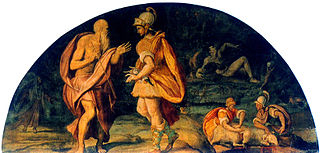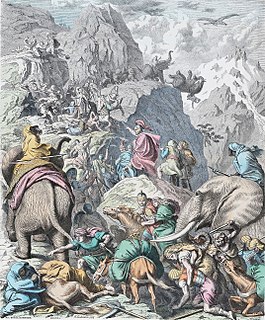Related Research Articles

Pūblius Ovidius Nāsō, known in English as Ovid, was a Roman poet who lived during the reign of Augustus. He was a contemporary of the older Virgil and Horace, with whom he is often ranked as one of the three canonical poets of Latin literature. The Imperial scholar Quintilian considered him the last of the Latin love elegists. Although Ovid enjoyed enormous popularity during his lifetime, the emperor Augustus banished him to a remote province on the Black Sea, where he remained a decade until his death.

The Roman triumph was a civil ceremony and religious rite of ancient Rome, held to publicly celebrate and sanctify the success of a military commander who had led Roman forces to victory in the service of the state or in some historical traditions, one who had successfully completed a foreign war.

Livia Drusilla was a Roman empress from 27 BC to AD 14 as the wife of Emperor Augustus Caesar. She was known as Julia Augusta after her formal adoption into the Julian family in 14 AD.

In Greek mythology, the satyr Marsyas is a central figure in two stories involving music: in one, he picked up the double oboe (aulos) that had been abandoned by Athena and played it; in the other, he challenged Apollo to a contest of music and lost his hide and life. In antiquity, literary sources often emphasize the hubris of Marsyas and the justice of his punishment.

Daphne, a minor figure in Greek mythology, is a naiad, a variety of female nymph associated with fountains, wells, springs, streams, brooks and other bodies of freshwater.

A gallus was a eunuch priest of the Phrygian goddess Cybele and her consort Attis, whose worship was incorporated into the state religious practices of ancient Rome.
Cardea or Carda was the ancient Roman goddess of the hinge, Roman doors being hung on pivot hinges. The Augustan poet Ovid conflates her with another archaic goddess named Carna, whose festival was celebrated on the Kalends of June and for whom he gives the alternative name Cranê or Cranea, a nymph. Ovid's conflation of the goddesses is likely to have been his poetic invention, but it has also been conjectured that Carna was a contracted form of Cardina, and at minimum Ovid was observing that their traditions were congruent.

In ancient Roman religion and myth, Janus is the god of beginnings, gates, transitions, time, duality, doorways, passages, frames, and endings. He is usually depicted as having two faces. The month of January is named for Janus (Ianuarius). According to ancient Roman farmers' almanacs, Juno was mistaken as the tutelary deity of the month of January; but, Juno is the tutelary deity of the month of June.

Religion in ancient Rome consisted of varying imperial and provincial religious practices, which were followed both by the people of Rome as well as those who were brought under its rule.

The Parilia is an ancient Roman festival of rural character performed annually on 21 April, aimed at cleansing both sheep and shepherd. It is carried out in acknowledgment to the Roman deity Pales, a deity of uncertain gender who was a patron of shepherds and sheep.
Arruns Tarquinius was the second son of Lucius Tarquinius Superbus, the seventh and last King of Rome.

A katabasis or catabasis is a journey to the underworld. Its original sense is usually associated with Greek mythology and Classical mythology more broadly, where the protagonist visits the Greek underworld, also known as Hades. The term is also used in a broad sense of any journey to the realm of the dead in other mythological and religious traditions. A katabasis is similar to a nekyia or necromancy, where someone experiences a vision of the underworld or its inhabitants; a nekyia does not generally involve a physical visit, however. One of the most famous examples is that of Odysseus, who performs something on the border of a nekyia and a katabasis in book 11 of The Odyssey; he visits the border of the realms before calling the dead to him using a blood ritual, with it being disputed whether he was at the highest realm of the underworld or the lowest edge of the living world where he performed this.

Apollo and Daphne is a transformation myth from ancient Greek mythology, retold by Hellenistic and Roman authors in the form of an amorous vignette.

The Thebaid is a Latin epic poem written by the Roman poet Statius. Published in the early 90s AD, it contains 12 books and recounts the clash of two brothers, Eteocles and Polynices, over the throne of the Greek city of Thebes. After Polynices is sent into exile, he forges an alliance of seven Greek princes and embarks on a military campaign against his brother.

The Fasti, sometimes translated as The Book of Days or On the Roman Calendar, is a six-book Latin poem written by the Roman poet Ovid and published in AD 8. Ovid is believed to have left the Fasti incomplete when he was exiled to Tomis by the emperor Augustus in 8 AD. Written in elegiac couplets and drawing on conventions of Greek and Latin didactic poetry, the Fasti is structured as a series of eye-witness reports and interviews by the first-person vates with Roman deities, who explain the origins of Roman holidays and associated customs—often with multiple aetiologies. The poem is a significant, and in some cases unique, source of fact in studies of religion in ancient Rome; and the influential anthropologist and ritualist J.G. Frazer translated and annotated the work for the Loeb Classical Library series. Each book covers one month, January through June, of the Roman calendar, and was written several years after Julius Caesar replaced the old system of Roman time-keeping with what would come to be known as the Julian calendar.

The Punica is a Latin epic poem in seventeen books in dactylic hexameter written by Silius Italicus comprising some twelve thousand lines. It is the longest surviving Latin poem from antiquity. Its theme is the Second Punic War and the conflict between the two great generals Hannibal and Scipio Africanus. The poem was re-discovered in either 1416 or 1417 by the Italian humanist and scholar Poggio Bracciolini.
Caesar's Comet was a seven-day cometary outburst seen in July 44 BC. It was interpreted by Romans as a sign of the deification of recently assassinated dictator, Julius Caesar. It was perhaps the most famous comet of antiquity.
In Greek mythology, Periphas was a legendary king of Attica, whom Zeus turned into an eagle. Aside from a passing reference in Ovid's Metamorphoses, the only known source for this story is the second century AD or later Metamorphoses of Antoninus Liberalis.

In Greek mythology, Leucothoe was a Babylonian princess as the daughter of Orchamus, a king of Persia, and a lover of Helios the god of the Sun. Her life was cut short when a nymph named Clytie, herself in love with Helios, informed Leucothoe's father of the affair who then buried his daughter alive. Helios then transformed Leucothoe's dead body into a frankincense tree.
Publius Valerius Poplicola was a Roman politician and general in the mid 4th century BC who served as Roman Consul, Praetor, Dictator, and Magister Equitum during his career.
References
- ↑ G. Karl Galinsky, The Cipus Episode in Ovid's Metamorphoses, Transactions and Proceedings of the American Philological Association Vol. 98 (1967), pp. 181-191
- ↑ Ovid, Metamorphoses XV.552-621